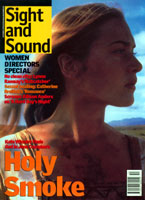Primary navigation

Germany 1998
Reviewed by Peter Curran
Our synopses give away the plot in full, including surprise twists.
A documentary featuring the 'lost' Cuban musicians who were brought together by guitarist Ry Cooder to record the million-selling album Buena Vista Social Club. The 90-year-old musician Compay Segundo revisits a Havana neighbourhood looking for the eponymous club. Cooder explains his passion for this music. At a studio, the band records their next album, a showcase for singer Ibrahim Ferrer. Each of the main players - singers Ferrer and Omara Portuondo, pianist Rubén González, Segundo and others - recount their lives and personal philosophies. This is intercut with concert footage shot in Amsterdam and the studio sessions from Ferrer's solo album. The band travels to New York where the impressions of those who have never been outside Cuba are mixed with songs from their climactic performance at Carnegie Hall.
Making the film of an album that was perhaps the last, eloquent atmospheric word on the spirit of Cuba, director Wim Wenders finds himself in the middle of the dancefloor, shifting awkwardly from foot to foot. Despite his felicity as the director of such documentaries as Notebook on Cities and Clothes and Tokyo-Ga, here Wenders elbows his way into the extraordinary musical performances with cutaways to interviews, exteriors and queasy steadicam shots. There are moments when the music is so badly out of synch with the pictures that it might be two different performances stuck together. At other times, with its numerous voiceovers from the Buena Vista Social Club artists describing their lives, the film seems to be revising Wenders' superb motif from Wings of Desire in which the soundtrack gave us access to solitary characters' thoughts. The more extrovert members of the band sound wise and engaging; the quieter ones like they're giving a statement to the police.
Despite the clumsy execution, the film is a valid celebration of musical sophistication and ageless optimism. This is no slap-down for the running dogs of Yankee-imperialism; there's a Cocoon-like aura about all the participants - their musical gift has thrown up a force field against cynicism during hard times. The visual evidence of Cuba's decline is beautifully caught with overexposed film to create a sunbleached effect that goes with the now anaemic Cadillacs and Buicks that were once part of the sumptuous pre-revolutionary Cuban experience of the 50s.
The musicians are rightly the stars of the film. The singer Ibrahim Ferrer was reduced to shining shoes before being rediscovered and offers rum and biscuits to a small deity in his home, thankful that Cuba's lack of consumerism has protected the human spirit. The elegant 80-year-old pianist Rubén González successfully eludes documentary inquisition by affecting a Ralph Richardson-like air of bemusement. By contrast, the incorrigible Compay Segundo - a combination of Dean Martin and Sid James - brandishes his cigar as he assures us that years of toil in the tobacco fields have had little effect on his sexual potency. The one woman featured is wreathed in old-school glamour: Omara Portuondo wafts through her childhood streets singing to curious bystanders. As she nears the end of the road, you expect her to cry, "I'm ready for my close-up now, Mr DeMille!" On stage she delivers words loaded with raw experience and you feel guilty for thinking her a sentimental old diva.
The concert sections are the most expansive and entertaining parts of the movie. Scorsese's The Last Waltz (1978) apart, few music films ever transmit the immediacy and emotional thrill of live performance. This one does. The musical dynamic fluctuates between strutting, sensual urgency and delicate pathos, and throughout the band smile easily at each other as if they have no real control over this extraordinary rush of dexterity and power. This transcendence is what their musical lives have been about. The performers are physically divided into two tiers. Cooder, dressed in black, positions himself towards the back of the stage, leaving the frontline and the spotlight to the Cubans. Yet because the director repeatedly cuts to him, in his discreet gloom he begins to resemble a brooding gorilla whose continuing approval of the music going on in front of him must be constantly monitored.
When the band prepares for their final concert at Carnegie Hall, there is an opportunity for most of these aged players to see New York for the first time. It's a moving moment when the anti-consumerist Ferrer presses himself against a wall amid the high-rise, traffic-clogged intestine of American capitalism, exclaiming, "It's so beautiful!" Two band members fail to recognise a bust of JFK in a novelty-shop window. The film-maker's lingering reliance on observing these innocents abroad raises an impatience for the final rush of concert footage. The band suddenly look their age as they strike up amid the vastness of Carnegie Hall and are visibly affected by this unexpected gift of noisy acclaim near the end of their lives. The playing is as exuberant as ever and the indestructible tautness of their technique leaves you in awe of the superannuated cool of the Buena Vista Social Club, reaching the summit of their career after only half a century of hard climbing.